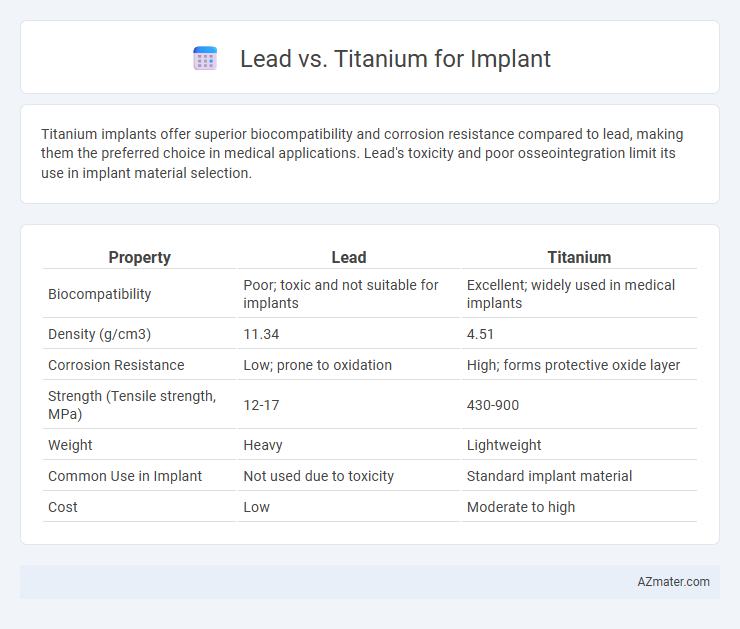Titanium implants offer superior biocompatibility and corrosion resistance compared to lead, making them the preferred choice in medical applications. Lead's toxicity and poor osseointegration limit its use in implant material selection.
Table of Comparison
| Property | Lead | Titanium |
|---|---|---|
| Biocompatibility | Poor; toxic and not suitable for implants | Excellent; widely used in medical implants |
| Density (g/cm3) | 11.34 | 4.51 |
| Corrosion Resistance | Low; prone to oxidation | High; forms protective oxide layer |
| Strength (Tensile strength, MPa) | 12-17 | 430-900 |
| Weight | Heavy | Lightweight |
| Common Use in Implant | Not used due to toxicity | Standard implant material |
| Cost | Low | Moderate to high |
Introduction to Lead and Titanium Implants
Lead implants are rarely used in modern medical applications due to their toxicity and poor biocompatibility, posing significant health risks such as lead poisoning and immune reactions. Titanium implants are the gold standard in implantology, known for their exceptional biocompatibility, corrosion resistance, and osseointegration capabilities, making them ideal for dental, orthopedic, and craniofacial implants. The widespread adoption of titanium implants stems from their ability to integrate seamlessly with bone tissue, promoting long-term stability and reducing the risk of implant failure.
Material Properties: Lead vs Titanium
Titanium exhibits high biocompatibility, corrosion resistance, and strength-to-weight ratio, making it the preferred material for dental and orthopedic implants. Lead, while dense and malleable, lacks biocompatibility and poses toxicity risks, rendering it unsuitable for implantation. The superior osseointegration and non-toxic nature of titanium ensure long-term stability and patient safety in medical applications.
Biocompatibility Comparison
Titanium implants exhibit exceptional biocompatibility, integrating seamlessly with bone tissue due to their ability to form a stable oxide layer that promotes osseointegration. Lead, in contrast, is highly toxic and rejected by biological systems, causing adverse reactions such as inflammation and heavy metal poisoning when used in implants. The superior biocompatibility of titanium makes it the preferred material for dental and orthopedic implants, ensuring long-term stability and patient safety.
Corrosion Resistance and Durability
Titanium exhibits superior corrosion resistance compared to lead, making it the preferred material for long-term dental and orthopedic implants. Its biocompatibility and ability to form a stable oxide layer prevent degradation and ensure durability in the body's harsh environment. Lead's susceptibility to corrosion and toxic ion release limits its use in implant applications despite its density and malleability.
Safety Concerns of Lead in Implants
Lead poses significant safety risks when used in implants due to its toxic properties, including potential neurotoxicity and systemic poisoning from leaching. Unlike titanium, which is biocompatible and widely accepted in medical applications, lead can cause inflammation, tissue damage, and long-term health complications. Implant materials are rigorously evaluated for biocompatibility, and titanium remains the gold standard because it does not elicit adverse immune responses or toxicity.
Titanium’s Role in Modern Implantology
Titanium remains the gold standard in modern implantology due to its exceptional biocompatibility and ability to osseointegrate with bone tissue, providing long-term stability and durability for dental implants. Unlike lead, which is toxic and unsuitable for medical applications, titanium is corrosion-resistant and lightweight, minimizing adverse reactions and enhancing patient safety. Advances in titanium surface treatments and implant design continue to improve bone integration and clinical outcomes.
Health Risks Associated with Lead Implants
Lead implants pose significant health risks due to lead's toxicity, which can cause systemic poisoning, neurological damage, and organ failure. Titanium, by contrast, is biocompatible and widely used in implants for its corrosion resistance and minimal risk of adverse immune reactions. Choosing titanium implants reduces the likelihood of chronic inflammation, metal poisoning, and long-term health complications compared to lead-based options.
Cost and Availability of Both Materials
Titanium implants are widely favored due to their excellent biocompatibility, corrosion resistance, and moderate cost, making them readily available in the dental and medical implant markets. Lead, though less common and generally avoided because of its toxicity and poor biocompatibility, tends to be cheaper but is rarely used for implants due to significant health risks. The cost-effectiveness of titanium combined with its clinical safety ensures its dominance over lead in implant manufacturing and availability.
Regulatory Standards for Implant Materials
Titanium is widely recognized and approved by major regulatory agencies such as the FDA and ISO for use in implant materials due to its biocompatibility, corrosion resistance, and strength, ensuring patient safety and implant longevity. Lead is generally prohibited in implant applications because of its toxicity and lack of biocompatibility, failing to meet stringent regulatory standards for medical devices. Compliance with ASTM F67 and ISO 5832-2 standards confirms titanium's suitability as the industry benchmark material for orthopedic and dental implants.
Conclusion: Which Material is Better for Implants?
Titanium remains the preferred material for implants due to its exceptional biocompatibility, corrosion resistance, and ability to osseointegrate effectively with bone tissue. Lead's toxicity and poor biological compatibility make it unsuitable for implant applications, posing significant health risks. For long-term implant success and patient safety, titanium is undeniably the superior choice.

Infographic: Lead vs Titanium for Implant
 azmater.com
azmater.com